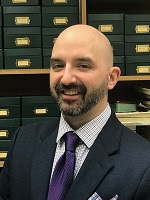ARCHIVED: NOT AVAILABLE FOR CREDIT
Next-Generation Immunohistochemistry: How to Build Highly Effective Diagnostic Tests in Anatomic Pathology
Immunohistochemistry is an indispensable complement to diagnosis and predicting response to therapy and has applications across basic, translational, and clinical research. Everybody benefits from smart, technically sound immunohistochemistry. This lecture will describe the concept of next-generation immunohistochemistry and will present several novel diagnostic markers “discovered” through this approach. It will also emphasize the importance of careful antibody selection, optimization, and validation.
Originally presented on November 18, 2021, in Salt Lake City, Utah.
Lecture Presenter
 | Andrew M. Bellizzi, MD Clinical Professor of Pathology |
Andrew M. Bellizzi, MD is a Clinical Professor in the Department of Pathology at the University of Iowa. Dr. Bellizzi completed undergraduate work in Anthropology and Science Preprofessional Studies at the University of Notre Dame in 2000 and received his medical degree from Northwestern University in 2004. Following combined training in Anatomic and Clinical Pathology at the University of Virginia in 2008, he completed a fellowship in Gastrointestinal and Liver Pathology at Ohio State University in 2009. After two years as a junior faculty at Brigham and Women’s Hospital, he moved to Iowa in the Fall of 2011.
Dr. Bellizzi is director of Immunohistochemistry, GI Pathology, and the GI Pathology Fellowship at the University of Iowa. He is an active member of the United States and Canadian Academy of Pathology, the American Society of Clinical Pathology, and the College of American Pathologists, including serving as Chair of the USCAP Stowell-Orbison Award and the CAP Immunohistochemistry Committees. He is secretary-treasurer of the International Society for Immunohistochemistry and Molecular Morphology and is an associate and assistant editor of Applied Immunohistochemistry and Molecular Morphology and the American Journal of Clinical Pathology, respectively. Dr. Bellizzi’s research interests include the diagnosis, classification, and etiopathogenesis of human disease, with an emphasis on gastrointestinal, pancreatic, neuroendocrine, and hereditary tumors. His research program focuses on applications of diagnostic immunohistochemistry.
Objectives
After this presentation, participants will be able to:
- Define and describe the concept of next-generation immunohistochemistry (IHC) and how it applies to tumor diagnosis
- Differentiate the steps of new IHC test selection, optimization, and validation and be able to access a series of useful tools to assist in these processes
- Apply next-generation IHC markers to the following differential diagnoses: hepatocellular carcinoma vs. cholangiocarcinoma or metastasis, paraganglioma/pheochromocytoma vs. neuroendocrine tumor, adenocarcinoma of upper GI origin vs. other adenocarcinomas
Sponsored by:
University of Utah School of Medicine, Department of Pathology, and ARUP Laboratories
 Site Search
Site Search

